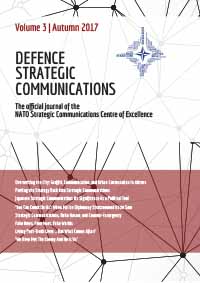Japanese Strategic Communication: Its Significance as a Political Tool
Japanese Strategic Communication: Its Significance as a Political Tool
Author(s): Chiyuki AoiSubject(s): Politics / Political Sciences, Politics, Social Sciences, Political Sciences, Governance, Communication studies
Published by: NATO Strategic Communications Centre of Excellence
Keywords: Strategic Communication; Communication; Strategy;Politics and government;;Japan;
Summary/Abstract: Despite rising tensions in East Asia, the Japanese government has not adopted a comprehensive policy, doctrine, or institution for strategic communication (StratCom) to date. The lack of a formal StratCom concept or framework, however, does not mean that Japan is not engaged in strategic communication. The review provided in this article reveals the heavy reliance of the government on the machineries of public diplomacy to communicate its policy and intent, through which it wishes to integrate its messages.Moreover, Japan is an avid practitioner of ‘messaging via deeds’, an aspect hitherto not understood as a Japanese StratCom practice. Japan’s de facto practice of strategic communication reflects the fundamentally political nature of strategic communication,building as it must upon the particular political and historical landscape of the nation,in which the rise of China is a central factor. The analysis outlines the key challenges for Japanese StratCom practice, namely, the danger of miscalculations occurring as a result of uncoordinated messaging, especially via deeds; the ‘say-do gap’ as the government struggles to fulfill some of its aspirations under the rubric of ‘proactive contribution to peace’, and the difficulty of sending coherent messages and avoiding unintended messaging.
Journal: Defence Strategic Communications
- Issue Year: 3/2017
- Issue No: 3
- Page Range: 71-102
- Page Count: 32
- Language: English

